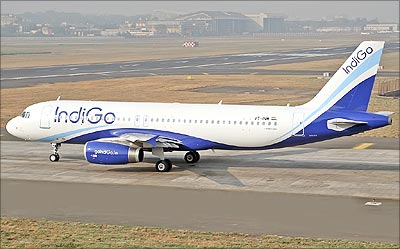The carriers are scoffing at making the life of their competitors 'easier' by purchasing Domestic Flying Credits from them.

Current rules require airlines to have flown in India for five years and have 20 planes in their fleet before they are allowed to fly abroad.
According to the proposed changes, airlines will have to acquire credits based on the routes they fly to earn international flying rights. A quarter of these credits can be bought by airlines from their competitors.
“Why should we sell our credits to them and make their life easy? We waited for five years. It is a bizarre idea that we will trade and help them compete with us," said a senior executive with a leading airline. The bigger airlines will have 4,000-5,000 credits, much higher than what they need for flying abroad.
Even new airlines say the idea is a non-starter. "Why will they sell their credits to start-ups? They will keep them rather than sell these to competitors,” said an airline executive who did not wish to be named. He was also unsure how credits would be priced without any regulation.
Airlines need 300 credits to fly to international destinations more than six hours away and 600 credits to destinations closer home. Airlines that start flying abroad will have to maintain a minimum 200 credits every year.
AirAsia India Chief Executive Officer Mittu Chandilya told the Business Standard on Friday the proposed rules discriminated against budget airlines.
Those flying abroad now will have an upper hand over start-ups, because credits will be granted on their past records. New airlines will not be able to fly on lucrative short-haul routes, such as Singapore and Dubai, for at least two years, according to sector estimates.
“In most cases, budget airlines use narrow-bodied aircraft that have a range of up to four hours. So, I can earn 300 credits but my planes cannot fly on the routes I am eligible for. To counter this, I will have to induct longer-range aircraft that will break my low-cost model,” Chandilya said.
The government believes trading in credits with regional airlines will enhance connectivity in remote areas. “The trading of capacity will give small aircraft operators incentive to sell credits to scheduled airlines that do not operate in remote areas,” a presentation by the government to airline representatives reviewed by the Business Standard said. Aircraft with less than 20 seats will earn 10 times more credits than a airplane flying on a city route for a scheduled airline.
Air Costa is the only regional scheduled airline in the country and there are 120 non-scheduled operators.
The ministry has said regional carriers will have to necessarily convert to scheduled airlines in three years. Non-scheduled operators will need to convert in a year.
ANGRY BIRDS
According to the proposed rule, airlines will have to gain a minimum domestic flying credits based on routes and distance, to get global flying rights
It is proposed 25% of credits can be purchased by airlines from rivals to complete their requirement
Top airlines will have far more credits than needed to qualify
An executive of a leading airline says, “Why should we sell our credit to new airlines and make their lives easy? It is a bizarre idea that we will trade and help these compete with us"